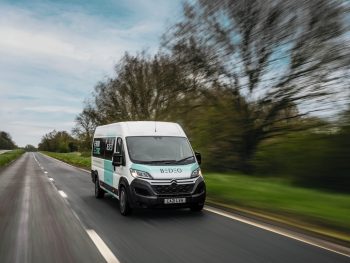UK vehicle electrification specialist Bedeo has called on the new Labour government to support van retrofitting as a key part of the low-emission transition.

The company, formerly known as BD Auto, has emphasised that retrofitting is crucial to meeting the UK’s net-zero goals now, not in 2035, as it points to alarming research.
A recent report from McKinsey & Company found that light commercial vehicles account for 40% of all logistics-related emissions; eight times higher than the 5% attributed to air freight.
With diesel LCV sales in 2024 rising and slow EV progress, Bedeo says retrofitting offers a faster, cost-effective solution to transition existing diesel vans to electric.
While high upfront costs, limited availability, and perceived reductions in load space are significant barriers to buying brand-new eLCVs, retrofitting an electric powertrain through Bedeo’s Reborn Electric programme provides a cost-effective alternative to purchasing a brand-new eLCV. This enables electrification at a significantly lower price while preserving load space and reducing the overall CO2 emissions produced by LCVs.
Bedeo is urging large van fleets and regulators to recognise the potential of electric retrofitting, particularly with its Stellantis-approved Reborn Electric system, which adds an electric powertrain to ageing diesel vans, giving them a new lease of life.
Osman Boyner, founder and CEO of Bedeo, said retrofitting electric powertrains is a pragmatic solution to achieve a faster LCV transition to net zero.
“The ‘TCO2’ approach, as we have coined it, combines total cost of ownership and CO2 considerations, offering a sustainable and economically viable path forward for large van fleets across the country. We have worked tirelessly to ensure that our retrofit solution ensures a lower TCO compared to investing in entirely new [large van / LCV] fleets, with operators able to realise savings on fuel and maintenance while also allowing for operational continuity – retrofitting can be accomplished with minimal downtime, ensuring that fleet operations remain uninterrupted,” he explained.
Boyner added that the UK van industry is at a pivotal moment.
“Without swift action and the adoption of innovative solutions like our in-wheel motor technology, we risk falling short of our impending net-zero goals,” he continued. “We urge the Government to recognise and support these alternative electrification pathways, which not only make economic sense – for both the country and fleet managers everywhere – but are crucial for achieving our environmental commitments.”
Bedeo’s whitepaper, titled ‘Accelerating the Transition, Supporting our Businesses: Enabling Low-Emission Fleets with Retrofit Electrification’, highlights the urgent need for retrofitting incentives to speed up fleet electrification, and is available to download here.
The guide also calls for retrofitters to be tighter regulated and scrutinised on safety and quality standards.

